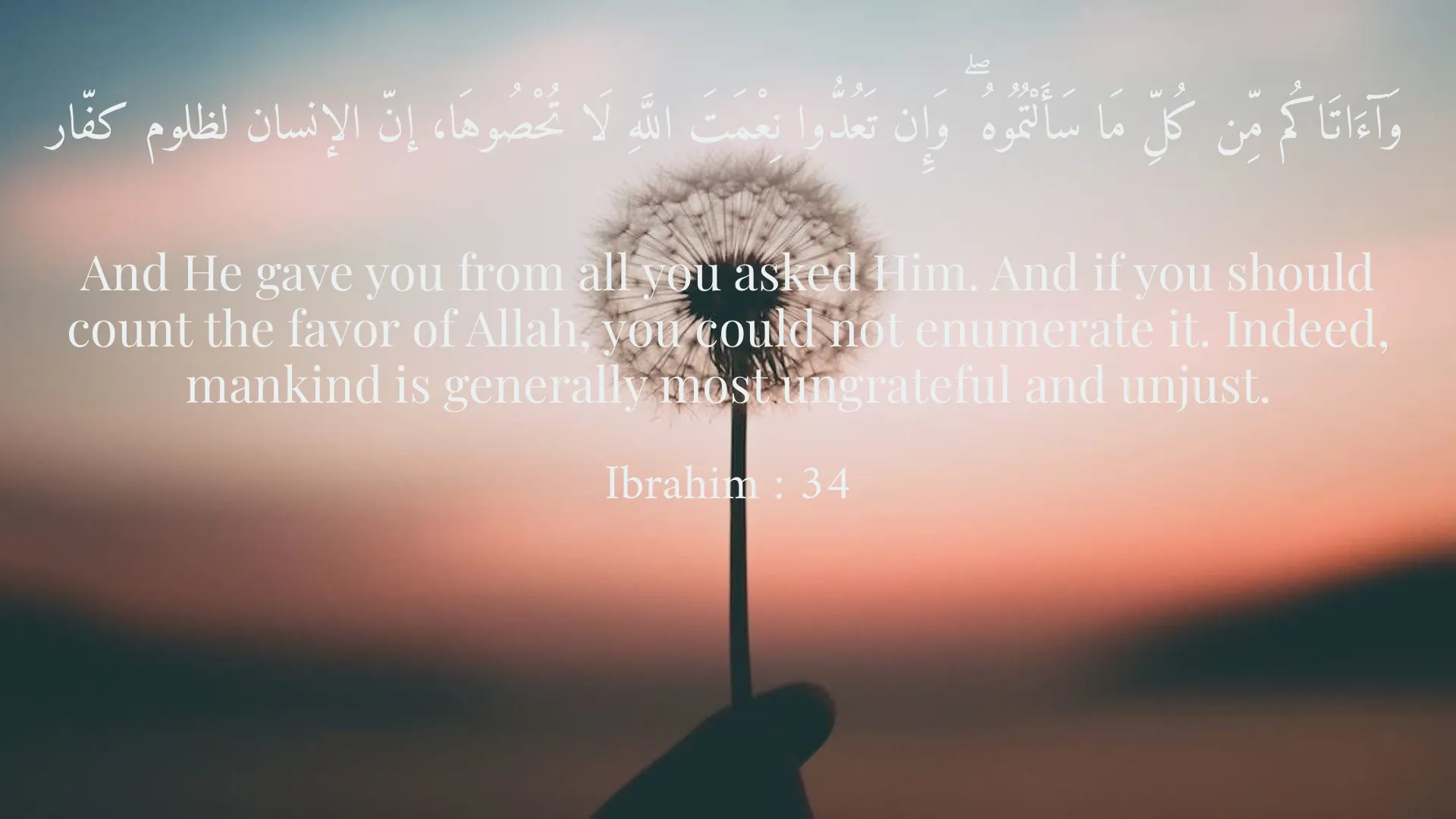Quranic Answer

Denial of blessings is a concept that resonates deeply within the realms of human experience and spirituality. It refers to the act of rejecting or showing disregard for the innumerable blessings one receives in life. This phenomenon can take various forms, and notably, it is addressed in significant detail in the Holy Quran. Within its sacred verses, the Quran articulates the gravity of denying blessings, emphasizing that such denial is not confined to mere words but is also expressed through actions and behavior. One of the most poignant illustrations of this concept can be found in Surah Ibrahim, verse 34, which states: 'And He gave you from all you asked Him. And if you should count the favor of Allah, you could not enumerate it. Indeed, mankind is generally most ungrateful and unjust.' This verse serves as a profound reminder of the pervasive human tendency toward ingratitude and the injustice it breeds. In essence, it highlights that a core aspect of human nature often leans towards overlooking the countless gifts bestowed by Allah. The essence of this denial can be examined through various lenses, particularly in the context of personal behavior and societal attitudes. Denial of blessings is not just a matter of verbal expression; it often manifests through actions that contradict the acknowledgment of divine gifts. For instance, consider individuals who possess health, wealth, and opportunities yet engage in behaviors that squander these blessings. This could encompass reckless spending, neglecting one's health, or failing to utilize one's skills constructively. Such actions reveal a deeper level of ingratitude that goes beyond mere words. Instead of actively expressing gratitude and utilizing their blessings in a manner that is beneficial for themselves and society, these individuals inadvertently fall into a pattern of denial. In addition to actions, personal choices also play a crucial role in the denial of blessings. Each day, individuals face countless decisions that reflect their values and priorities. When individuals choose paths that lead them away from righteousness or reject divine teachings in favor of momentary gratification, they are effectively denying the blessings that come with guidance and wisdom. The struggle between good and evil is an ever-present reality, and choosing to overlook the guidance provided can lead to a life filled with turmoil and regret. Moreover, societal attitudes can greatly influence individual behaviors in relation to the denial of blessings. Communities that foster a culture of dissatisfaction often breed individuals who exhibit a similar mindset. When societal narratives glorify wealth, status, or superficial success while disregarding the intrinsic value of gratitude and humility, individuals may naturally gravitate towards ingratitude. This can perpetuate a cycle where blessings are continuously overlooked, leading to a collective denial of the abundance in life. In light of this understanding, it is crucial to recognize that denial of blessings transcends mere forgetfulness. It is an active choice that individuals make in response to their experiences, conditioning, and environment. By examining the actions and choices that define their lives, individuals can gain valuable insights into their relationship with the blessings they have been granted. Self-reflection can serve as a powerful tool for transformation, allowing individuals to engage with their blessings in a more profound manner. On a spiritual level, the act of acknowledging blessings can foster a closer relationship with Allah. Recognizing the gifts in one’s life cultivates a sense of humility and appreciation, encouraging individuals to express their gratitude through prayer, generosity, and good deeds. This reflective practice not only enhances one’s spiritual connection but also contributes positively to mental and emotional well-being. Studies have shown that gratitude can lead to increased levels of happiness and satisfaction in life, reinforcing the notion that appreciating one’s blessings leads to a more fulfilling existence. Practicing gratitude entails more than simply uttering words of thanks. It requires active engagement with the blessings in one’s life. This can manifest in various forms, such as sharing one’s wealth with those who are less fortunate, volunteering time to help others, or utilizing one’s talents and skills for the betterment of society. Such actions not only honor the blessings received but also enhance an individual’s sense of purpose and fulfillment. Furthermore, cultivating a mindset of gratitude involves developing a habit of recognizing the beauty in everyday experiences. This can be as simple as appreciating the warmth of the sun, the comfort of a home, or the love of family and friends. By consciously choosing to focus on the positive aspects of life, individuals can shift their perspective from one of entitlement to one of appreciation. In conclusion, the denial of blessings is a multi-faceted issue that transcends mere words and is deeply rooted in human behavior, choices, and attitudes. The Quran poignantly addresses the ungrateful nature of humanity and reminds us of the importance of recognizing and cherishing the gifts of Allah. By actively engaging with our blessings, making mindful choices, and fostering a culture of gratitude, we can break the cycle of denial and cultivate a more fulfilling and enriched life. The journey toward gratitude is not merely an individual endeavor; it is a collective responsibility that can transform lives, communities, and ultimately, humanity as a whole.
Related Verses
وَآءَاتَاكُم مِّن كُلِّ مَا سَأَلْتُمُوهُ ۖ وَإِن تَعُدُّوا نِعْمَتَ اللَّهِ لَا تُحْصُوهَا، إنّ الإنسان لظلوم کفّار
And He gave you from all you asked Him. And if you should count the favor of Allah, you could not enumerate it. Indeed, mankind is generally most ungrateful and unjust.
Ibrahim : 34
Short Story
One day, a young man named Amir was walking through the city streets contemplating the value of blessings. He recalled that he should be grateful for Allah's gifts. Along his path, he unexpectedly met an old man who invited him to a olive tree. This tree always produced sweet fruits, and the old man stated, 'This blessing should be appreciated, not only through words but also through actions.' This conversation made Amir realize that he needed to pay more attention to his behavior regarding blessings.